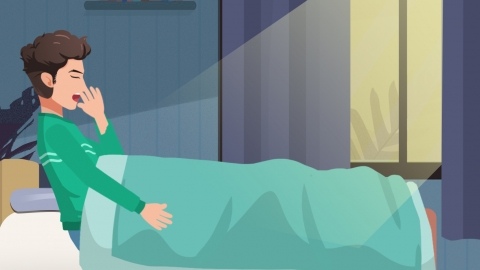What causes dizziness and lightheadedness after waking up?
Generally, dizziness and blurred vision upon waking may be caused by insufficient sleep, incorrect sleeping posture, rapid changes in body position, hypoglycemia, anemia, or other factors. Symptomatic management through general treatment or medication may be necessary. If symptoms persist, it is recommended to seek timely medical attention and undergo appropriate treatment under a physician's guidance. Detailed analysis is as follows:

1. Insufficient Sleep
Poor sleep quality at night, mental stress, frequent dreaming, and other factors may prevent the brain from receiving sufficient rest, leading to sleep deprivation. Sleep deprivation can cause sympathetic nerve excitement, resulting in strong cerebral vasoconstriction, elevated blood pressure, and cerebral ischemia, which may cause symptoms such as dizziness and blurred vision upon waking. It is recommended to maintain a healthy sleep schedule, avoid using electronic devices before bedtime, and improve sleep hygiene to alleviate symptoms.
2. Incorrect Sleeping Posture
Incorrect sleeping postures, such as covering the head with bedding or sleeping in a prone position, may hinder cerebral blood flow and oxygen supply, causing poor circulation and resulting in dizziness and blurred vision upon waking. These symptoms are usually not accompanied by other significant symptoms, but long-term effects may impair sleep quality. It is recommended to adjust sleeping posture, avoid compressing the head and neck vessels, and maintain a comfortable sleep environment.
3. Rapid Change in Body Position
Upon waking, if body position is changed quickly, blood needs to be rapidly redistributed to the head to maintain cerebral perfusion. If blood flow regulation is delayed, it may cause transient cerebral hypoperfusion, resulting in dizziness and blurred vision, possibly accompanied by vertigo, nausea, or visual darkening. It is recommended to rise or change positions slowly, allowing sufficient time for the body to adjust.
4. Hypoglycemia
Insufficient food intake before sleep or delayed dinner may lead to low blood glucose levels in the morning. When blood glucose levels drop too low, the brain's energy supply is reduced, leading to dizziness and blurred vision, which may also be accompanied by sweating, tremors, palpitations, and other symptoms. It is recommended to immediately consume sugary foods or drinks and, under medical guidance, use medications such as glucose and sodium chloride injection, hydrocortisone tablets, or mannitol injection to alleviate symptoms.
5. Anemia
Poor nutrition or impaired hematopoietic function may lead to anemia. In anemic conditions, oxygen transport efficiency is reduced, resulting in insufficient oxygen supply to the brain and causing dizziness and blurred vision. This may also be accompanied by fatigue, pallor, palpitations, and other symptoms. It is recommended to undergo treatment under a physician's guidance using medications such as ferrous sulfate sustained-release tablets, iron(II) fumarate tablets, or ammonium ferric citrate and vitamin B1 syrup II.
It is recommended to maintain a regular sleep schedule in daily life, pay attention to appropriate sleep duration, and avoid excessive or insufficient sleep to prevent physical discomfort.




